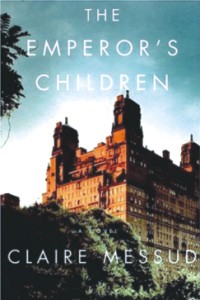Book Review
An Elegant Satire of Solipsism in Manhattan
Katie Owen
 Inevitably, 9/11 has become grist to the mill of fiction. Recently Jay McInerney in The Good Life, and now Claire Messud, in her Booker-longlisted fourth novel, have used the event in order to portray the 'state of the nation' or more specifically the state of the Manhattan intelligentsia. Inevitably, 9/11 has become grist to the mill of fiction. Recently Jay McInerney in The Good Life, and now Claire Messud, in her Booker-longlisted fourth novel, have used the event in order to portray the 'state of the nation' or more specifically the state of the Manhattan intelligentsia.
Messud shows up the superficiality and political apathy of a generation through her main protagonists: a trio of 30-year-old ex-college friends, Marina, Danielle and Julius.
From the moment the book opens, one senses a writer of confidence and maturity, expansive, sure of her ground and savouring her own sonorous prose (its Jamesian inflections occasionally tipping over into pretentiousness).
Messud has proved in her previous novels that she is an intelligent and ambitious writer whose fiction is concerned with matters well beyond the personal and domestic. Yet she can do private lives with aplomb, and on the most engaging level The Emperor's Children is a novel of Manhattan friendship, family and affairs of liaisons which entwine in an ever more dangerous way, with the threat of individual disaster mounting as the months count down from March through to that fateful September.
None of the three college friends is fully engaged or indeed employed in life at the book's opening, and none is in a relationship; their hopes and dreams are more or less unfocused. Messud ironises their naivety and their privileged positions with varying degrees of severity, reserving her strongest implied criticism for the most 'entitled' of them, Marina, the beautiful yet obtuse daughter of a famous journalist, Murray Thwaite, himself the undisputed emperor of intellectual New York City.
Anti-Clinton, anti-Bush, former anti-war activist, Thwaite is a magnificently portrayed egotistical monster, fêted throughout town and maintaining a high moral stance while secretly indulging in numerous affairs. Meanwhile, his wife one of two key characters who fail fully to come to life slaves away as a non-profit-making family lawyer (Messud clearly never means us to question her moral rectitude).
While Marina stays at her parents' smart home on the Upper West Side, busy not getting on with a book commission, her friend Danielle works desultorily as a TV documentary producer and lives in a 15th-floor studio apartment in lower Manhattan (featuring a picture window perfectly positioned to view the as-yet intact skyline). Julius is a gay, impecunious writer of 'devastating but elegant' book reviews, with an unwritten novel in his bottom drawer, who is covertly supporting himself through temporary secretarial work.
There are questions implicit throughout this absorbing novel about the value of books, whether reading or writing them, as opposed to more practical values such as hard work or kindness towards other people. A foil to the three friends and the towering figure of Murray Thwaite is his nephew 'Bootie' Tubbs, a younger, no less self-absorbed character determined to educate himself through intensive reading rather than formal education, who abandons his poor widowed mother in her upstate suburb to come to worship at Thwaite's feet. Tubbs is a pathetic but unfortunately somewhat cartoonish figure, and his role, to expose all the more the hollowness of the others, is over-played.
However, there is much to enjoy here, not least Messud's delicate yet devastating use of irony, her nuanced portrayal of character and motive and her vivid descriptions of New York interiors. If on philosophical and political levels the novel fails to resonate as one suspects is intended, with 9/11 functioning as little more than a dramatic plot device, The Emperor's Children is still worth reading.
This review first appeared in The Telegraph.
Copyright (R) thedailystar.net 2007 |
